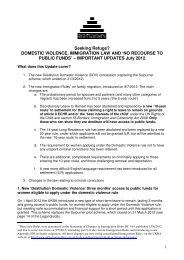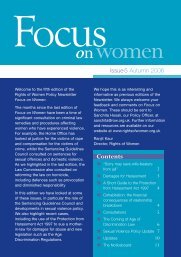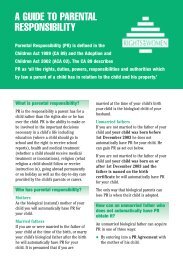Entering into a civil partnership - Rights of Women
Entering into a civil partnership - Rights of Women
Entering into a civil partnership - Rights of Women
Create successful ePaper yourself
Turn your PDF publications into a flip-book with our unique Google optimized e-Paper software.
A GUIDE TO ENTERING INTO<br />
A CIVIL PARTNERSHIP<br />
The Civil Partnership Act 2004 (CPA) came <strong>into</strong><br />
force in England and Wales on 5th December 2005<br />
and creates the new legal relationship <strong>of</strong> <strong>civil</strong> <strong>partnership</strong>. The CPA gives<br />
lesbian and gay couples who enter <strong>into</strong> <strong>civil</strong> parnerships legal recognition<br />
<strong>of</strong> their relationship and the same rights and responsibilities that those<br />
who have entered <strong>into</strong> a <strong>civil</strong> marriage have. A <strong>civil</strong> <strong>partnership</strong> is therefore<br />
a serious legal commitment and it can only be ended by dissolution or<br />
annulment or by the death <strong>of</strong> one <strong>of</strong> the partners.<br />
This information sheet relates only to the legal aspects <strong>of</strong> forming a <strong>civil</strong><br />
<strong>partnership</strong>. For practical advice and emotional support see the “Other<br />
useful telephone numbers” section at the end <strong>of</strong> this leaflet.<br />
The law<br />
A <strong>civil</strong> <strong>partnership</strong> is a relationship<br />
between two people <strong>of</strong> the same-sex which:<br />
is formed by registration in England or<br />
Wales, or<br />
has been entered <strong>into</strong> abroad but is<br />
recognised by the CPA.<br />
Under the CPA you and your <strong>civil</strong> partner<br />
will:<br />
be each other’s next-<strong>of</strong>-kin<br />
be able to apply for parental<br />
responsibility for each other’s children<br />
be treated in the same way as married<br />
couples for the purposes <strong>of</strong> life<br />
assurance<br />
have additional employment and<br />
pension benefits<br />
inherit each other’s property<br />
automatically if one partner dies<br />
without having a will<br />
be able to apply for fatal accidents<br />
compensation<br />
be able to apply for protection from<br />
domestic violence<br />
be recognised for immigration and<br />
nationality purposes<br />
have to provide reasonable maintenance<br />
for your <strong>civil</strong> partner and any children <strong>of</strong><br />
the family if the relationship breaks<br />
down<br />
have similar financial obligations as<br />
opposite-sex non-resident parents for<br />
supporting children if the relationship<br />
breaks down, and<br />
not be compelled to testify against each
other in court (unless the case involves<br />
domestic violence or a vulnerable<br />
person such as a child).<br />
Who can enter <strong>into</strong> a <strong>civil</strong><br />
<strong>partnership</strong>?<br />
You can enter <strong>into</strong> a <strong>civil</strong> <strong>partnership</strong> if you<br />
are over 18 years old (people between 16<br />
and 18 will need their parents’ permission)<br />
providing that neither you nor your partner<br />
are already in a <strong>civil</strong> <strong>partnership</strong> (nor<br />
married) nor closely related to each other.<br />
Seek legal advice if you are unsure<br />
whether you are closely related or not.<br />
<strong>Entering</strong> <strong>into</strong> a <strong>civil</strong> <strong>partnership</strong><br />
Below is the standard procedure for<br />
entering <strong>into</strong> a <strong>civil</strong> <strong>partnership</strong> (where<br />
neither <strong>of</strong> you is subject to immigration<br />
control). However, if you and/or your<br />
partner are housebound, detained in prison<br />
or hospital or terminally ill there are<br />
special procedures that can be followed.<br />
You and your partner will need to give<br />
notice in person to the register <strong>of</strong>fice for<br />
the area where you live. The area where<br />
you live is the area where you have resided<br />
for at least seven days (even if you have<br />
travelled to the UK from abroad to<br />
register). If you wish to enter <strong>into</strong> a<br />
<strong>partnership</strong> in a different area to where<br />
you live you should also contact the<br />
registration authority where you would like<br />
the registration to take place because you<br />
need to ensure that a <strong>civil</strong> <strong>partnership</strong><br />
registrar will be available to attend the<br />
registration on the day that you want.<br />
You will need to provide the register <strong>of</strong>fice<br />
with the following information:<br />
your name and surname<br />
your date <strong>of</strong> birth<br />
your relationship status (whether you<br />
have been single, in a <strong>civil</strong> <strong>partnership</strong><br />
or marriage before)<br />
your nationality<br />
details <strong>of</strong> the place where you intend to<br />
register your <strong>civil</strong> <strong>partnership</strong>.<br />
If you have been in a <strong>civil</strong> <strong>partnership</strong> or<br />
marriage before you will also need to<br />
produce documents that confirm that you<br />
are now free to register a <strong>civil</strong> <strong>partnership</strong>.<br />
These could include:<br />
a decree absolute <strong>of</strong> your divorce<br />
a final order <strong>of</strong> dissolution <strong>of</strong> a <strong>civil</strong><br />
<strong>partnership</strong><br />
a death certificate <strong>of</strong> your former <strong>civil</strong><br />
partner or husband.<br />
After notice has been given you must wait<br />
15 days before the <strong>civil</strong> <strong>partnership</strong> can be<br />
registered. Once the 15 days has passed<br />
you and your partner will be free to enter<br />
<strong>into</strong> a <strong>partnership</strong> at any time over the<br />
following year. So if you and your partner<br />
give notice on 5th March 2006 the<br />
registration can take place on or after 21st<br />
March 2006 but must be take place before<br />
21st March 2007.<br />
Where can we register our <strong>civil</strong><br />
<strong>partnership</strong>?<br />
A <strong>civil</strong> <strong>partnership</strong> can be registered at a<br />
register <strong>of</strong>fice or any premises that has<br />
been approved for the registration <strong>of</strong> <strong>civil</strong><br />
<strong>partnership</strong>s. Approved premises can<br />
include hotels and restaurants, stately<br />
homes and even certain beaches or football<br />
grounds. To search for your local register<br />
<strong>of</strong>fice or approved premises contact the<br />
General Register Office.<br />
On the day <strong>of</strong> registration both <strong>of</strong> you will<br />
sign the <strong>civil</strong> <strong>partnership</strong> schedule in<br />
the presence <strong>of</strong> the registration <strong>of</strong>ficer and
two witnesses. The registration <strong>of</strong>ficer and<br />
the witnesses will then also sign the <strong>civil</strong><br />
<strong>partnership</strong> schedule. The CPA does not<br />
make provision for a ceremony so you can<br />
choose to simply sign the schedule or<br />
organise your own ceremony. The CPA<br />
forbids any religious service from taking<br />
place during the registration <strong>of</strong> a <strong>civil</strong><br />
<strong>partnership</strong> as it is a non-religious process.<br />
If you wish you can arrange your own<br />
religious service to take place before or<br />
after the registration <strong>of</strong> your <strong>civil</strong><br />
<strong>partnership</strong>. Once you have registered your<br />
<strong>civil</strong> <strong>partnership</strong> you will receive a <strong>civil</strong><br />
<strong>partnership</strong> certificate.<br />
Legal relationships formed outside<br />
<strong>of</strong> the UK<br />
If you have registered a relationship<br />
outside <strong>of</strong> the UK you will be treated as<br />
having formed a <strong>civil</strong> <strong>partnership</strong> for the<br />
purposes <strong>of</strong> UK law (providing that it is not<br />
against public policy to give your<br />
relationship recognition) if your<br />
relationship was formed in one <strong>of</strong> the<br />
following places: Belgium (cohabitation<br />
légale or marriage), Canada (Nova Scotia –<br />
domestic <strong>partnership</strong>) (Quebec – <strong>civil</strong><br />
union), Denmark (registreret<br />
partnerskab), Finland (rekisteröity<br />
parisuhde), France (PACS), Germany<br />
(Lebenspartnerschaft), Iceland (stadfesta<br />
samvist), Netherlands (geregistreerde<br />
partnerschap or marriage), Norway or<br />
Sweden (registrert partnerskap) and USA<br />
(Vermont – <strong>civil</strong> union).<br />
Or, your relationship meets certain<br />
general conditions, for example, that you<br />
have entered <strong>into</strong> a legal relationship<br />
which means that you are treated as a<br />
couple.<br />
Registering a <strong>civil</strong> <strong>partnership</strong><br />
outside <strong>of</strong> the UK<br />
You can enter <strong>into</strong> a <strong>civil</strong> <strong>partnership</strong><br />
abroad in the British Embassy or High<br />
Commission <strong>of</strong> the county concerned<br />
(providing that the country does not object<br />
to the registration taking place). The<br />
procedure is the same for registering a<br />
<strong>civil</strong> <strong>partnership</strong> in the UK but in some<br />
countries you may be asked to obtain<br />
further documentation. Contact your local<br />
registration authority or the Embassy or<br />
High Commission concerned for further<br />
information.<br />
Civil <strong>partnership</strong>s and children<br />
For information about your rights and<br />
responsibilities in respect <strong>of</strong> each other’s<br />
children please see <strong>Rights</strong> <strong>of</strong> <strong>Women</strong>’s<br />
information sheets on parental<br />
responsibility, residence, child contact<br />
and lesbian parenting.<br />
Family relationships<br />
The CPA amends family law so that:<br />
Child <strong>of</strong> the family includes a child or<br />
children who you and your <strong>civil</strong> partner<br />
treat as a child <strong>of</strong> your family (with the<br />
exception <strong>of</strong> children placed with you as<br />
foster parents).<br />
<strong>Entering</strong> <strong>into</strong> a <strong>civil</strong> <strong>partnership</strong> has the<br />
same effect as entering <strong>into</strong> marriage<br />
on your family relationships. This<br />
means that the sister <strong>of</strong> your <strong>civil</strong><br />
partner will become your sister-in-law<br />
and the aunt <strong>of</strong> any child <strong>of</strong> your family.
Financial rights given by the CPA<br />
Welfare benefits and tax credits<br />
From 5th December 2005 same-sex couples<br />
who live together and who are claiming<br />
welfare benefits and / or tax credits will be<br />
treated as a couple and not as two single<br />
people. This will apply to couples whether<br />
they are <strong>civil</strong> partners or simply living<br />
together. This means that if you live with<br />
your same-sex partner and one or both <strong>of</strong><br />
you is claiming any <strong>of</strong> the following<br />
benefits as a single person, you will need<br />
to claim again as a couple:<br />
Income Support<br />
Income Based Jobseeker’s Allowance<br />
Pension Credit<br />
Housing or Council Tax Benefit<br />
Tax Credits<br />
When you apply for these benefits as a<br />
couple the income and savings <strong>of</strong> both you<br />
and your partner will be taken <strong>into</strong> account<br />
when working out whether you are eligible<br />
for benefit and how much you are eligible<br />
for. This means that you may no longer be<br />
entitled to benefits that you are currently<br />
receiving or that the amount you receive<br />
goes down.<br />
However, if you get Maternity Allowance,<br />
Incapacity Benefit, Carer’s Allowance<br />
or Severe Disability Allowance, you may<br />
be able to claim extra benefit for your <strong>civil</strong><br />
partner. Contact your local benefits <strong>of</strong>fice<br />
for further information about welfare<br />
benefits and tax credits as this is a<br />
complex area.<br />
Tax<br />
Civil partners will be treated in the same<br />
way as married couples for all tax<br />
purposes. This will mean that you and your<br />
<strong>civil</strong> partner will be able to transfer assets<br />
to each other, such as property or shares,<br />
without having to pay Capital Gains Tax<br />
(CGT). If one <strong>of</strong> you was born before 6th<br />
April 1935, you will be eligible for a tax<br />
allowance. If one <strong>of</strong> you dies any money or<br />
property you leave the other will be free<br />
from inheritance tax. However, on<br />
entering a <strong>civil</strong> <strong>partnership</strong> you lose your<br />
individual CGT allowance in relation to<br />
the transfer or disposal <strong>of</strong> property or<br />
assets to others.<br />
Employment<br />
Employers may give their employees<br />
benefits either for themselves or their<br />
spouses and partners. Some <strong>of</strong> these<br />
benefits, such as parental, adoption or<br />
carer’s leave are required by law whilst<br />
others, such as travel expenses or private<br />
heath insurance are discretionary.<br />
Employment regulations forbid<br />
discrimination in the provision <strong>of</strong><br />
employment benefits to same-sex partners<br />
in comparison with unmarried oppositesex<br />
partners. The CPA extends this<br />
protection by forbidding discrimination in<br />
the provision <strong>of</strong> benefits to <strong>civil</strong> partners<br />
in comparison with married couples.<br />
This means that as a <strong>civil</strong> partner you will<br />
have the same employment rights as a<br />
married person to, for example, take time<br />
<strong>of</strong>f work to deal with certain emergencies<br />
involving your <strong>civil</strong> partner. Similarly,<br />
where discretionary benefits have been<br />
<strong>of</strong>fered to married employees but not cohabiting<br />
couples (whether same-sex or<br />
opposite-sex) these benefits must now be<br />
<strong>of</strong>fered to <strong>civil</strong> partners. This means<br />
employers cannot treat <strong>civil</strong> partners less<br />
favourably than married couples but that<br />
they can treat <strong>civil</strong> partners and married<br />
couples more favourably than co-habiting<br />
couples (whether same-sex or oppositesex).
Pensions<br />
As a <strong>civil</strong> partner you will have most <strong>of</strong> the<br />
same state pension rights as widowers and<br />
will be treated the same as widows and<br />
widowers after 2010 (when the state<br />
retirement age becomes the same for men<br />
and women). You will also be able to claim<br />
survivor pensions in public service<br />
schemes and contracted-out pension<br />
schemes.<br />
As is the case with other employment<br />
benefits (see above) employment<br />
regulations and the CPA forbids<br />
discrimination between same-sex couples<br />
and unmarried opposite-sex couples and<br />
between <strong>civil</strong> partners and married<br />
partners. So, if you or your partner belongs<br />
to an occupational or private pension<br />
scheme which <strong>of</strong>fers benefits to married<br />
partners (such as the payment <strong>of</strong> death in<br />
service benefits or a survivor’s pension)<br />
that scheme must <strong>of</strong>fer the same benefits<br />
to <strong>civil</strong> partners.<br />
Death <strong>of</strong> a <strong>civil</strong> partner<br />
When you register a <strong>civil</strong> <strong>partnership</strong> any<br />
will that either <strong>of</strong> you has made is<br />
automatically invalidated unless it was<br />
made with the formation <strong>of</strong> a <strong>civil</strong><br />
<strong>partnership</strong> in mind. If your <strong>civil</strong> partner<br />
dies without having made a will you will<br />
inherit her estate. Civil partners will<br />
inherit money and any property free from<br />
inheritance tax.<br />
When you enter <strong>into</strong> a <strong>civil</strong> <strong>partnership</strong> you<br />
become your partner’s next-<strong>of</strong>-kin. This<br />
means you will be able to register your<br />
partner’s death and have the right to<br />
organise their funeral. If you are not in a<br />
<strong>civil</strong> <strong>partnership</strong> you will only be able to<br />
register your partner’s death if you were<br />
present when they died or if you are<br />
organising the funeral.<br />
As a <strong>civil</strong> partner you will be entitled to<br />
claim bereavement benefits and fatal<br />
accidents compensation on the same<br />
basis as widows and widowers. You will<br />
also have the same rights as widows and<br />
widowers to succeed to tenancies where<br />
you were occupying the property at the<br />
time <strong>of</strong> your partner’s death and<br />
(depending on the type <strong>of</strong> tenancy<br />
involved) the property is your only or<br />
principal home.<br />
The law relating to <strong>civil</strong> <strong>partnership</strong>s<br />
can be complex and we have provided<br />
a very basic overview <strong>of</strong> terminology,<br />
law, court practice and procedure. We<br />
would also strongly advise you to seek<br />
legal advice by either telephoning our<br />
legal advice line or a solicitor.<br />
Please note that the law as set out in this information sheet is the law as it<br />
stood at the date <strong>of</strong> publication. The law may have changed since then and<br />
accordingly you are advised to take up-to-date legal advice. <strong>Rights</strong> <strong>of</strong> <strong>Women</strong><br />
cannot accept responsibility for any reliance placed on the legal information<br />
contained in this information sheet. This information sheet is designed to give<br />
general information only.<br />
© <strong>Rights</strong> <strong>of</strong> <strong>Women</strong> September 2006
For free confidential legal advice on family law including <strong>civil</strong><br />
<strong>partnership</strong>s, lesbian parenting and financial relief call the <strong>Rights</strong> <strong>of</strong><br />
<strong>Women</strong> Advice Line on 020 7251 6577 (telephone) or 020 7490 2562<br />
(textphone).<br />
Tuesday, Wednesday and Thursday 2pm – 4pm and 7pm – 9pm<br />
Friday 12 noon – 2pm<br />
Other useful telephone numbers<br />
Child Support Agency 08457 133 133 www.csa.gov.uk<br />
Community Legal Service 0845 345 4345 www.clsdirect.org.uk<br />
(for finding a solicitor)<br />
Department <strong>of</strong> Work and Pensions<br />
www.dwp.gov.uk<br />
Benefit Enquiry Line 0800 882 200<br />
Tax Credits Helpline 0845 300 3900<br />
General Register Office<br />
www.gro.gov.uk<br />
Pink Parents 08701 273 274 www.pinkparents.org.uk<br />
London Lesbian and Gay Switchboard 020 7837 7324 www.llgs.org.uk<br />
Stonewall 020 7593 1850 www.stonewall.org.uk<br />
<strong>Women</strong> and Equality Unit<br />
www.womenandequalityunit.gov.uk<br />
<strong>Rights</strong> <strong>of</strong> <strong>Women</strong>, 52-54 Featherstone Street, London EC1Y 8RT<br />
Office/Admin: 020 7251 6575/6<br />
Textphone: 020 7490 2562<br />
Fax: 020 7490 5377<br />
Email: info@row.org.uk<br />
Website: www.rights<strong>of</strong>women.org.uk<br />
Industrial and Provident Society No: 23221R
















